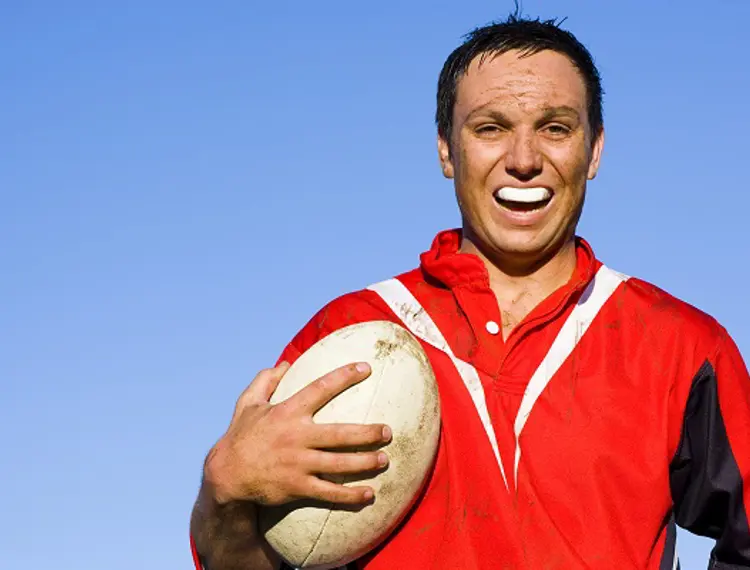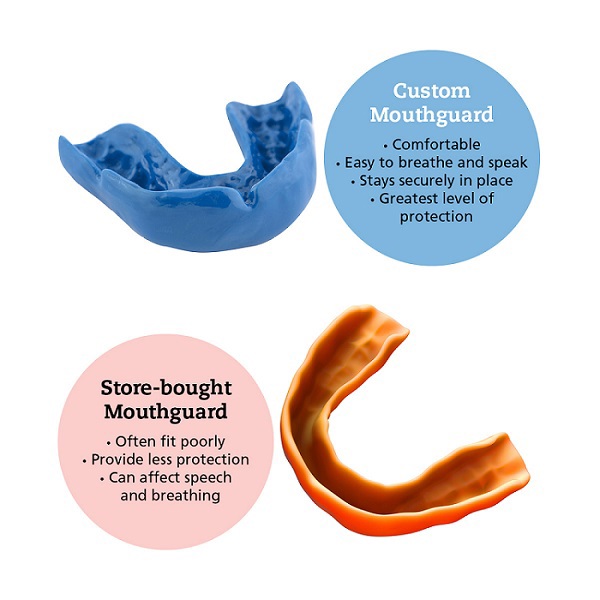
Key messages
- Sports mouthguards protect teeth and jaws from serious injuries.
- Mouthguards should be worn during sports training and games.
- A mouthguard custom made by a dentist will provide the most protection for the teeth and mouth.
- All Australian sports clubs are encouraged to have a mouthguard policy and make wearing mouthguards mandatory for their players.
A sports mouthguard can protect you from serious sporting injuries, such as broken jaws, fractured, cracked or knocked-out teeth, cut lips and tongues. If you play a sport, you are at risk of injuring your teeth and mouth. These injuries are often difficult and can be expensive to treat. They can also need a lifetime of dental treatment.
It is not only contact sports like rugby union, rugby league, AFL, hockey and boxing can lead to these injuries. Sports such as cricket, basketball, netball, touch football, skateboarding and soccer can also cause damage to the teeth and mouth.
How does a mouthguard work?
Sports mouthguards work by absorbing and spreading the impact of a knock to the face. This knock may otherwise cause an injury to your mouth or jaws. To protect yourself, you need to wear your mouthguard at training and on game day.
Custom-made mouthguards
A custom-made mouthguard made by your dentist are the most protective for the teeth and mouth. They are designed to fit the shape of your teeth and mouth only. They are comfortable to wear. They also allow you to breathe and speak easily compared to mouthguards bought from sports stores and chemists.
How to get a custom-made mouthguard
See your dentist to get a custom-made mouthguard. It is best to have a check-up to make sure no other dental treatment is needed before your mouthguard is made.
To make the mouthguard, the dentist will take a mold or 3D scan of your teeth. This is used to make a mouthguard that fits firmly and comfortably around your teeth and gums.

Store-bought mouthguards
Mouthguards bought from chemists or sports stores include stock mouthguards and 'boil-and-bite' mouthguards. Store-bought mouthguards often fit poorly which can make them loose inside your mouth. This can make talking and breathing difficult. These mouthguards do not provide the same level of protection as a custom-made mouthguard.
Stock mouthguards
These are generic plastic mouthguards. They are not shaped to fit your teeth and gums.
'Boil-and-bite' mouthguards
These mouthguards are named after the process used to fit them in the mouth. The generic plastic mouthguard is placed in warm water and then molded in the mouth to fit the shape of your teeth. This do-it-yourself process can cause some parts of the mouthguard to be thinner than others. This can affect how well the mouthguard protects your teeth.
How do I care for my mouthguard?
It is important to look after your mouthguard. If it is used, stored, and fit checked by your dentist, it can last you multiple sporting seasons as long as you are no longer growing.
Tips for caring for your mouthguard include:
- do not store your mouthguard in direct sunlight
- wash it in cool or warm water
- store it dry and safely in a protective case
- write your name on both the mouthguard and its case.
'No Mouthguard, No Play' policy
The Australian Dental Association and Sports Medicine Australia have a Mouthguard Policy for sports clubs to have a 'no mouthguard, no play' policy. All Australian sports clubs are encouraged to sign up and make wearing mouthguards mandatory for their players.


